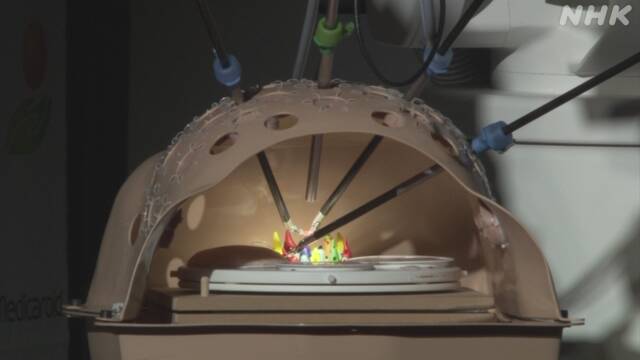Kawasaki Heavy Industries enters a new field of machine makers due to the influence of corona Kawasaki Heavy Industries supports surgery Robo November 18, 17:58
k10012719101_202011181809_202011181810.mp4
In response to sluggish demand for aircraft and other products due to the impact of the new coronavirus, major machine manufacturers are embarking on the development of new fields.
Of these, Kawasaki Heavy Industries is focusing on the field of precision robots, and on the 18th, it unveiled the surgery support robot "hinotori" that was jointly developed with a medical inspection equipment manufacturer.
This robot is equipped with surgical instruments such as a scalpel and four arms with an endoscopic camera, and is characterized by moving smoothly like a human hand.
It can be operated by a doctor who is away from the operating table, and on the 18th, using a model that resembled a human body, the wounds of the incised organs of the two arms were dexterously sewn with thread.
The technology cultivated in industrial robots is being utilized, and according to the Ministry of Health, Labor and Welfare, it is the first time that a Japanese manufacturer has obtained approval from the government to manufacture and sell a robot that supports surgery.
Kawasaki Heavy Industries is aiming to improve profitability by strengthening the field of precision robots, as the divisions such as aircraft parts, which were the top earners due to the influence of the new coronavirus, have fallen into the final deficit in the interim settlement of accounts this year. It is said.
Kawasaki Heavy Industries President Yasuhiko Hashimoto said, "The robot field is the field where growth is expected to be the highest in the company. I would like to utilize it in other businesses to increase competitiveness."
All major machine manufacturers are in the red
As the "heavy industry" in the company name indicates, major Japanese machinery manufacturers have focused on "big manufacturing" such as aircraft main wings and fuselage, railway vehicles, shipbuilding and power plant equipment.
In recent years, there has been an increase in global demand for aircraft, and each company has been focusing on manufacturing aircraft parts and engines, and the sales of this aviation plus space division are in the financial results for the fiscal year ending March. It accounted for nearly 20% to over 30%.
However, the situation changed completely with the spread of the new coronavirus infection.
The movement of people around the world was restricted and the demand for aircraft fell sharply, and the performance of each company quickly became severe.
In the interim results for this fiscal year, Mitsubishi Heavy Industries has a final deficit of 57 billion yen, Kawasaki Heavy Industries has a final deficit of 27.2 billion yen, and IHI has a final deficit of 9.5 billion yen.
IHI Mitsubishi Heavy Industries is also in a different field
While the outlook for the mainstay aircraft sector is uncertain, each company is trying to find a way out in a field that is significantly different from its previous mainstay.
The field that IHI wants to grow to the same scale as the aircraft sector is the development of "carbon solutions" and systems that reduce decarbonization and carbon dioxide emissions.
We are paying attention to ammonia, which does not emit carbon dioxide even when burned, and we are embarking on the development of a new power plant, saying that if we mix it with natural gas and use it as fuel for thermal power generation, we can significantly reduce carbon dioxide emissions. I will.
On the other hand, one of the businesses that Mitsubishi Heavy Industries is paying attention to as a new field is the business of creating a distribution system called a cold chain that maintains a low temperature.
In addition to food, there is increasing demand for low temperature control of pharmaceuticals that maintain the quality of vaccines.
We would like to develop fine-tuned temperature control utilizing AI = artificial intelligence and a distribution system that transports goods more efficiently, both in Japan and overseas.
Expert "From now on, a business that captures trends on the demand side"
Kosuke Tai, chief analyst at Daiwa Securities Equity Research Department, who is familiar with the trends of machine makers, said, "I think it will take five or six years for aircraft demand to return to the front of Corona. Under these circumstances, each company is beginning to change with a sense of speed." It is said.
On top of that, "Because of the history that has supported Japan's high economic growth, there was a strong aspect of developing business in the form of" I should be able to sell this because I made such an amazing thing. "From now on, it should be such a world. However, it is being tested whether it is possible to create a business that captures the trends on the demand side that there should be such needs. "

